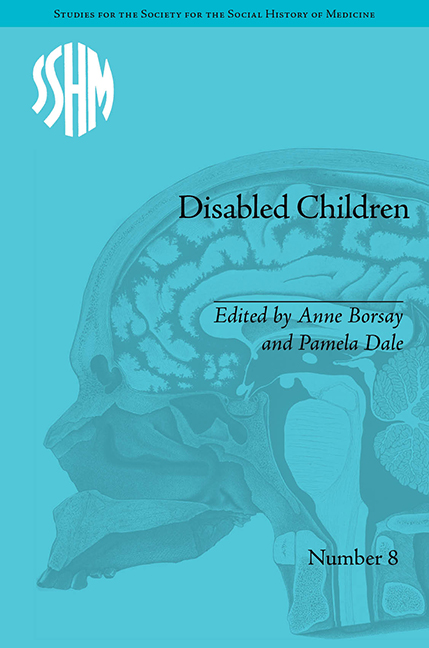Book contents
- Frontmatter
- Contents
- Acknowledgements
- Notes on Contributors
- Introduction: Disabled Children – Contested Caring
- 1 Club Feet and Charity: Children at the House of Charity, Soho, 1848–1914
- 2 Insanity, Family and Community in Late-Victorian Britain
- 3 The Mixed Economy of Welfare and the Care of Sick and Disabled Children in the South Wales Coalfield, c. 1850–1950
- 4 The Question of Oralism and the Experiences of Deaf Children, 1880–1914
- 5 Exploring Patient Experience in an Australian Institution for Children with Learning Disabilities, 1887–1933
- 6 From Representation to Experience: Disability in the British Advice Literature for Parents, 1890–1980
- 7 Treating Children with Non-Pulmonary Tuberculosis in Sweden: Apelviken, c. 1900–30
- 8 Health Visiting and Disability Issues in England before 1948
- 9 Spanish Health Services and Polio Epidemics in the Twentieth Century: The ‘Discovery’ of a New Group of Disabled People, 1920–70
- 10 Cured by Kindness? Child Guidance Services during the Second World War
- 11 Education, Training and Social Competence: Special Education in Glasgow since 1945
- 12 Hyperactivity and American History, 1957–Present: Challenges to and Opportunities for Understanding
- Notes
- Index
6 - From Representation to Experience: Disability in the British Advice Literature for Parents, 1890–1980
- Frontmatter
- Contents
- Acknowledgements
- Notes on Contributors
- Introduction: Disabled Children – Contested Caring
- 1 Club Feet and Charity: Children at the House of Charity, Soho, 1848–1914
- 2 Insanity, Family and Community in Late-Victorian Britain
- 3 The Mixed Economy of Welfare and the Care of Sick and Disabled Children in the South Wales Coalfield, c. 1850–1950
- 4 The Question of Oralism and the Experiences of Deaf Children, 1880–1914
- 5 Exploring Patient Experience in an Australian Institution for Children with Learning Disabilities, 1887–1933
- 6 From Representation to Experience: Disability in the British Advice Literature for Parents, 1890–1980
- 7 Treating Children with Non-Pulmonary Tuberculosis in Sweden: Apelviken, c. 1900–30
- 8 Health Visiting and Disability Issues in England before 1948
- 9 Spanish Health Services and Polio Epidemics in the Twentieth Century: The ‘Discovery’ of a New Group of Disabled People, 1920–70
- 10 Cured by Kindness? Child Guidance Services during the Second World War
- 11 Education, Training and Social Competence: Special Education in Glasgow since 1945
- 12 Hyperactivity and American History, 1957–Present: Challenges to and Opportunities for Understanding
- Notes
- Index
Summary
Introduction
Twentieth-century Britain was associated with an explosion of health advice. In their important study of texts for women industrial workers, Vicky Long and Hilary Marland found reproductive biology playing second fiddle to ‘hygiene, diet, exercise, recreation, fashion and beauty’. At the same time, however, literature on pregnancy and childcare proliferated, targeting professionals, schoolgirls and parents, especially mothers. This material has been analysed in terms of the transition from physical to psychological health, but what it had to say about disability has received relatively little attention. Chapter 6 will address this gap, focusing on the advice directed towards parents with children primarily under the age of one. A lot of information was conveyed in magazines and periodicals, but these are voluminous and sometimes hard to trace. Ephemera – for example, baby product leaflets circulated by commercial companies – were also commonplace, but often undated. And there were information films, but too few to track historical trends. Consequently, we will concentrate on advice books, using their publication dates and the revisions undertaken between editions to locate shifts in the guidance on offer between 1890 and 1980. In exploring how disability was represented, three main themes will be considered: the authoritarian approach to pregnancy and childcare, which gathered momentum from the late nineteenth century; its replacement by an intuitive approach in the aftermath of the Second World War; and the influence of this evolving literature on the experiences of disabled children and their families.
- Type
- Chapter
- Information
- Disabled ChildrenContested Caring, 1850–1979, pp. 87 - 102Publisher: Pickering & ChattoFirst published in: 2014



